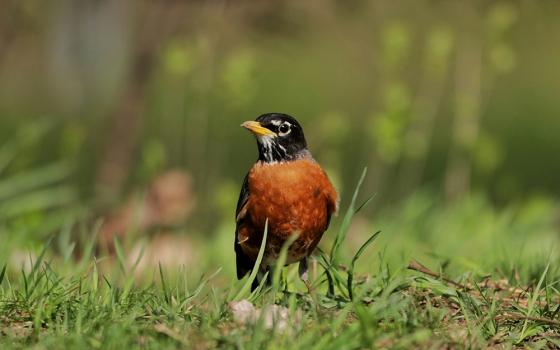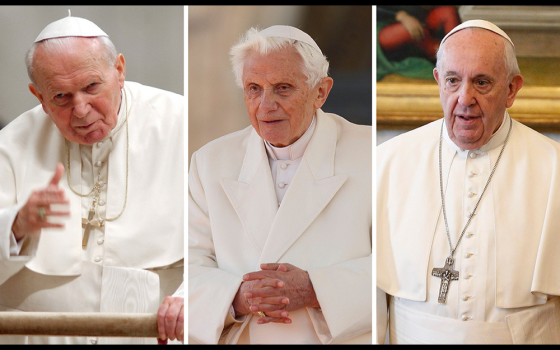Last night, EWTN aired an interview with Donald Trump, conducted by Raymond Arroyo, the host of their weekly news magazine show. The whole thing was not exactly surreal, but it was closer to that than to a standard journalistic interview. It had the feel of an audition: Not for Trump to be president, but for Arroyo to work at FOX News.
It is important to keep in mind that during the primaries, Trump showed up for interviews anywhere and anytime. Since the Republican convention and the arrival of Kellyanne Conway as his campaign manager, Trump mostly has limited his interviews to friendly hosts on FOX. Certainly, since the Billy Bush video leaked, Trump has not been available to do an interview on, say, "The Rachel Maddow Show" or even "Good Morning America." So, last night's interview on EWTN tells us something about how Republican operatives view Arroyo and EWTN: It is Catholic FOX, a place where you can pretend to ask the tough questions, but where the winking and nodding is almost palpable.
Arroyo opened the interview with a question about the women who have accused Trump of sexually assaulting them. "It's all made up!" Trump asserted, explaining that many media outlets had definitively disproven the claims made by the accusers, although this claim is demonstrably untrue. Arroyo did not challenge him on the untruth he had just spoken, but he did ask a follow-up about people who still have doubts, and he referenced the Billy Bush video in his question. "Locker room talk" said Trump, an answer which has not satisfied many Americans these past couple of weeks but which apparently satisfied Arroyo. He moved on.
A few moments later, Arroyo asks Trump is he has any regrets about how he has run his campaign. Such questions make Trump uncomfortable. You can see it on camera. But, when he calms his nerves with another lie — "We're doing very well in the polls" — Arroyo does not challenge him.
The interview turns to issues, sort of. In response to a question on how he became pro-life, Trump gives the answer we have all heard, about a couple he knows that debated whether or not to procure an abortion, decided against it, and the kid turned out great. I am not sure I find that plausible but no matter. On religious liberty, it is pretty clear that Trump has no idea what is at stake. "Religious liberty is in great trouble in this country," says the man who promised to ban Muslims from entering the United States. "Faith-based people are not being accepted anymore." It is not clear what he is referring to, and before he clarifies, he is off on a tangent about how unfair it is that the
Arroyo continued the mischaracterization of the Wikileaks emails pertaining to Catholics to suggest that Clinton's staff was hostile to Catholics. Of course, Arroyo neglects to mention that much of the email banter was among Catholics, or that the only email that really called for internal changes within the church did not come from one of Clinton's staff but was sent to one of them. When Trump says Clinton shouldn't even be allowed to run, Arroyo appears to be nodding in agreement. Not exactly what you would call a tough interview, which is why Trump agreed to do it.
The questions for the U.S. bishops is whether or not they think they should stake their ability to communicate with their flock on this network that Trump, quite rightly, views as a media quisling. And, it is not just Trump: The second interview last night featured Matt Schlapp, who leads the American Conservative Union, who said too many biased and misleading things in too short a time for me to write them all down. I think I left the room when he said that President Obama and Hillary Clinton are sending the message to foreign nationals that if they intend to immigrate to the U.S. they should "do it illegally." I returned to hear Schlapp explain that there are "thousands of people in jail" because of voter fraud, which is certainly news to me. So, again, should the bishops encourage EWTN to be their chosen means of communicating with the faithful?
An ad during the show featured Bishop Robert Barron, auxiliary bishop of Los Angeles, encouraging people to subscribe to the National Catholic Register. Barron took a swipe at the rest of the media before bestowing his blessing on the Register, which is owned by EWTN. I wonder if the bishop thinks Edward Pentin's articles from Rome are good for the church or not. I wonder if he thinks Msgr Charles Pope's attacks on the pope, which are published at the Register and which I have highlighted before, is an example of the kind of evangelization the church needs.
If you are looking for a hint as to the correct answer to those questions, consider this trailer for a so-called documentary to be aired at EWTN tonight. I would submit that if this trailer is reflective of the content of the film, "documentary" might not be the right word. Propaganda seems to come closer to the mark. Leni Riefenstahl had nothing on the person who produced this trailer. Is this the kind of thing with which bishops wish to be associated? Here it is:
Is this the Joy of the Gospel?
[Michael Sean Winters is NCR Washington columnist and a visiting fellow at Catholic University's Institute for Policy Research and Catholic Studies.]


